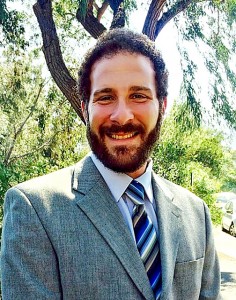QUESTION: Our oldest daughter has just graduated with her master’s in international business relations. After job searching, even before she graduated, and not finding a job she’s comfortable with here in the United States, she has decided to take a position with a bank in London.
After what’s been going on over there we’re very concerned with her decision. We’re willing to let her stay with us until she finds a suitable job here, no matter how long it takes, because we believe there is a possibility of danger there. She’s adamant about the move and to say we’re terrified is putting it mildly.
Peace of mind doesn’t exist right now in our home, even with her two younger brothers who don’t want her to go. We’ve been praying that, “God’s will be done.” Is there anything else we can be doing to put our minds at ease?
– Worried Parents
Dear Worried Parents,
I recently gave a sermon about Abraham and Isaac, where God asks Abraham to sacrifice his son. At this point in the narrative, Abraham behaves quite differently than before: he follows God without question! Throughout the passage (Genesis 22:1-14), the idea of sight is portrayed. “God will see to it” and “Here I am” is Abraham’s response to the questions posed by the text.
Thankfully, the story concludes with the family safe and their promised future secured.
Yet for its first readers (and contemporary ones), we know that much of life is not safe. We can, with substantial evidence, live in fear. And when we are confronted by fearful threats to our safety – or worse, the safety of those we love – we can seek to control what seems beyond our control.
I think your impulse is sound: praying that God’s will be done … and often this means that God will lead us toward danger rather than away from it. We engage with strangers among us, we love our enemies and we leave our nets to follow God. The promise we cling to, like Abraham before us, is that God will provide all that we need, especially God’s presence in the midst of danger. And, like Abraham, we may find it takes a lifetime to learn to trust God in this way.
My prayer for you is that no matter what the future holds you see God’s loving care extended to your family (even if you have every right to be afraid). As the psalmist proclaims, “Τhe Lord is my light and my salvation, whom shall I fear? The Lord is the stronghold of my life, of whom shall I be afraid?”
Pastor Kyle Sears
kylesears@
lacanadachurch.org
Dear Worried Parents,
What is the hardest thing to do when a child has grown up and is actually ready to start a trajectory in her own life? The hardest thing is to let her go and do it. Even without the latest terrorist attacks in London, it would be super difficult to let her go. London is across the Atlantic Ocean and who knows what kind of people she will encounter on her journey into the world of international business?
The truth is that we all face the kind of danger you are speaking of. Sadly, there are dangers and pitfalls no matter where you are located. I wish we could all be safe, happy, well fed and comfortable, living a life free of threat, disease, hurt, loss and sorrow. We all pray for that. Unfortunately, that is not what is true about life.
Do not let your imagination run wild with worst-case scenarios. Realize that your daughter has actually completed an education that has afforded her the possibility of gainful employment. She chose this a long time ago when she began her international business major. At the very least that implies travel to foreign locations that hold similar dangers. Even in the States there is danger.
We all must be aware of our surroundings and the people in them. We must scan the faces of those around us and look into their hearts instead of staring at our phones and devices. We must never go about this world without this awareness as it can save our lives.
Our task is at first to recognize the angst in others then be prepared to deal with it. This awareness of people and their moods can alert you to what might happen at any moment. That could give you the edge in any situation that could occur at any place you might be.
You have put so much into raising you children. At some point you must learn to trust them to look out for themselves. Make sure your daughter has the presence of mind to look deeply into the faces and body language of those around her. This practice will serve her well all the days of her successful and exciting future.
May God protect her from any danger and guard her coming and going on this crooked path of life.
Rabbi Janet Bieber
jbieber1155@aol.com
QUESTIONS: My husband passed away two months ago and now my two adult children want me to sell my home that I’ve lived in for 43 years. This is where they were raised. They think I should go into a retirement home where I won’t have to be concerned about cooking or gardening. In fact, I love to cook, even if it’s just for me, and my garden is therapy, although I do have a gardener who does the heavy work. The kids’ argument is that they would feel I was safer living in a retirement home and they wouldn’t have to worry about me.
I still drive, go to church regularly and go out frequently with friends to dinners and movies. I’m just tired of their badgering. Is there a way I can put this subject to rest once and for all?
~ Self-sufficient Mom
Dear Self-sufficient Mom,
My condolences for the recent loss of your husband! The loss of a loved one can often be a confusing time for both the surviving spouse and for the children as all are trying to make sense of the feelings of grief. Sadly, the pain that you’re experiencing can be accompanied by well-meaning advice from family and friends who sense the need to “do something” without quite knowing what that something may be.
My guess is that your children are dealing with their own grief compounded by the desire to care for and honor you in ways that you may or may not require at this point. Scripture reminds us in James 1:27 to “…care for orphans and widows…” and our family and friends may take that directive quite literally. Very often what we most need in the healing process is time. Your children may also be dealing with new fears for their own emotional should anything happen to you, leading to a degree of hyper-vigilance that can be disconcerting or off-putting at best.
As I’m not aware of the details of your situation, perhaps an open discussion of your wishes would help your children to understand the cost of additional change when the present requires you to adjust and simply get accustomed to life on your own. It sounds as though you keep yourself very busy and are active in your church and community. I believe these are benchmarks to call to the attention of your children, noting your ability to maintain a quality of life that is befitting your desires and lifestyle. These days, there are many ways to remain active and vital. There may come a time when you need to consider additional care. It would be appropriate to have a conversation with them about what factors will determine those future decisions. For now, however, you might try to help them understand that you’re capable and not in any imminent danger.
Ecclesiastes Chapter 3 tells us, “To everything there is a season, a time for every purpose under heaven” in verse 1 and that, “He has made everything beautiful in its time” in verse 11a (NKJV). It may be useful for you to help your children understand the meaning of these words as the Father intends for us to live according to our various seasons.
Blessings to you and your family as you navigate this time of growth!

Chaplain Lucinda Guarino
lguarino@ymcafoothills.org
Dear Self-Sufficient Mom,
You are so very lucky to have children who care so much for you. That being said, giving up one’s autonomy is not easy and not something anyone should insist on until you are ready. If their concern is your safety, then maybe there is a compromise you can make.
First of all, I would thank them and validate their concern, which I’m sure you’ve already done. Let them know you are grateful to have such loving children. Remind them that your mental health is as important as your physical health and how important cooking and gardening are to your wellbeing. Then, talk to them about some realistic alternative plans that you could implement which would reassure them that you are safe. Here are some suggestions.
1. Get some sort of medical monitoring or quick response system that will alert them and/or medical professionals if you find yourself alone and in trouble.
2. Create a timeline to reevaluate your situation. Tell them that you’ll sit down with them every six months or annually and discuss your ability realistically to care for yourself and your home.
3. Make a regular daily or weekly time for you to call, text or otherwise check in with them.
Let them know that the agreement is mutual and, in exchange for putting these safeguards in place, they should not badger you any more about it. You might word it in a more subtle manner.
Good luck,
Joshua Lewis Berg
jbergshua@gmail.com



